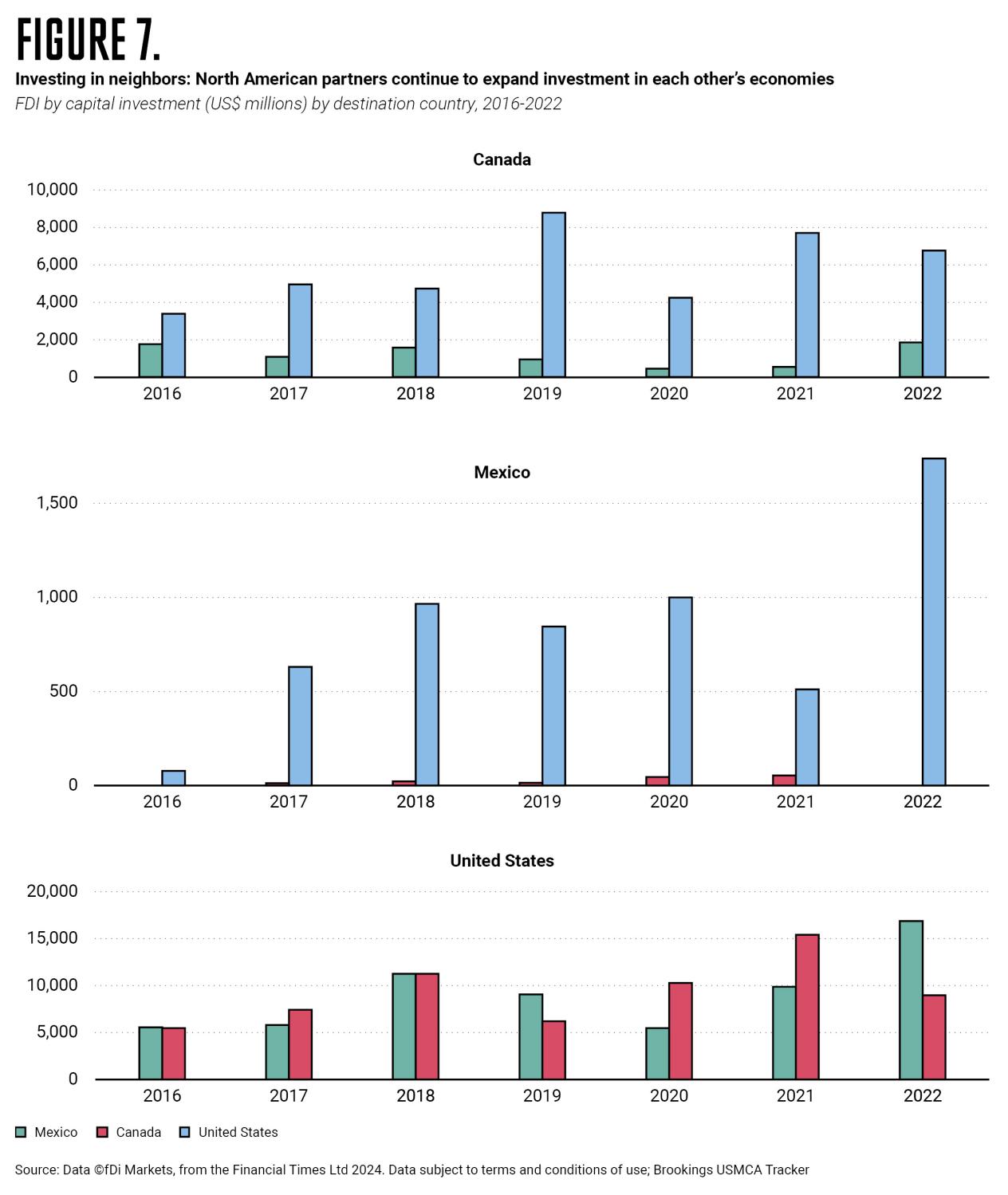This viewpoint is part of USMCA Forward 2024.
The private sector is committed to helping the three North American economies live up to their vast potential, including through the United States-Mexico-Canada Agreement (USMCA). Achieving that means understanding the benefits USMCA is delivering and acknowledging the challenges we still need to overcome. This ongoing study and the Brookings Institution’s data-driven approach help provide a clear picture of the path forward.
In evaluating USMCA, it is important to recognize that the North American economic relationship is as strong as ever. Three-way trade is valued at more than $1.7 trillion annually, a staggering sum approaching $5 billion daily. USMCA facilitates this success by setting the highest Free Trade Agreement standards in the world in areas such as digital trade, financial services, agricultural trade, and good regulatory practices.
This success is also built on cross-border collaboration that goes far beyond the exchange of goods and services. Our countries don’t just trade with each other, we make things together. North America boasts some of the most tightly knit supply chains in the world, which makes our continent better equipped than any other region to lead on the most pressing global priorities like mitigating dependencies in semiconductors and critical minerals while also enhancing our food and energy security.
We have every reason to assert that North America stands to be the most competitive region in the global economy. For us to achieve our shared potential as a continent, however, we must start by keeping our word. From the perspective of the U.S. Chamber of Commerce, the biggest roadblock to maximizing our potential is our collective failure to comply fully with the USMCA.
We have every reason to assert that North America stands to be the most competitive region in the global economy. For us to achieve our shared potential as a continent, however, we must start by keeping our word.
All three countries have contributed to this problem. For its part, Canada’s continued insistence on implementing a discriminatory Digital Services Tax (DST) is in contravention of both its USMCA and WTO obligations and the ongoing multilateral negotiations of the OECD/G20 Inclusive Framework’s two-pillar solution. On the Mexican side, the U.S. and Canada requested consultations on energy in July 2022 and had the right to request a dispute panel 90 days later if an agreement could not be reached. More than a year and a half have passed, and there is still no resolution, and no panel has been requested. As for the U.S., USMCA mandates that the losing party in a dispute implement a panel’s decision within 45 days. Over a year after the Automotive Rules of Origin decision was published, the U.S. has yet to take meaningful action to implement it.
Like any other trade agreement, USMCA is not worth the paper it is printed on if it is not enforced. Failing to address these disputes ahead of the pact’s joint review in 2026 undercuts the certainty investors depend on, adds cost and complexity for the business community, and risks undermining our indispensable continental trade and investment relationship. In North America, we have before us a generational opportunity to leverage the world’s most integrated supply chains to assume global leadership in the energy transition and leverage the massive economic potential of areas such as electric vehicle and battery production. But our success in these and all other areas hinges on ensuring that all three parties adhere to their respective USMCA obligations.
As we have for decades, the business community is committed to doing its part to advance North American competitiveness, but we need all three governments to fulfill their end of the bargain. Working with our partners in Mexico and Canada, the Chamber is leveraging initiatives such as the U.S.-Mexico CEO Dialogue and private sector participation in the North American Leaders’ Summit to advance competitiveness by enhancing policy recommendations in areas like workforce development, trade facilitation, energy, investment, and services. And because few things are as important as our shared supply chain resilience, we are advancing pilot projects in strategic sectors-such as semiconductors, medical devices, and electric vehicles and sharing our insights with government leaders.
With elections looming in all three countries, close collaboration between government and the private sector has never been more important. A USMCA that is fully implemented and adhered to by all three governments is a worthy focus for such collaboration. Executing on this goal will provide much needed certainty in the marketplace, and more importantly the jobs, innovations, and opportunities to ensure North America is the preeminent powerhouse in the global economy.

The Brookings Institution is committed to quality, independence, and impact.
We are supported by a diverse array of funders. In line with our values and policies, each Brookings publication represents the sole views of its author(s).






Commentary
To ensure long-term success of USMCA, compliance is paramount
March 6, 2024